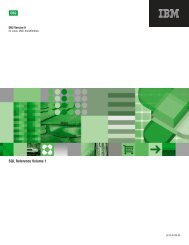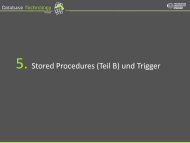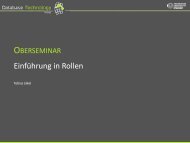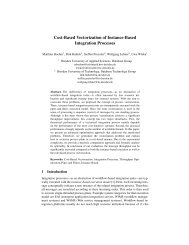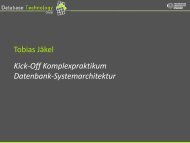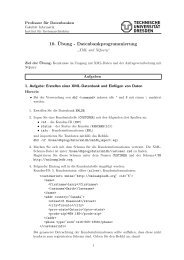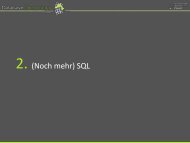- Page 1:
Cost-Based Optimization of Integrat
- Page 4 and 5:
of traditional data management syst
- Page 7 and 8:
Contents 1 Introduction 1 2 Prelimi
- Page 9:
Contents 6.5 Experimental Evaluatio
- Page 12 and 13:
1 Introduction for integration flow
- Page 14 and 15:
1 Introduction violated. We present
- Page 16 and 17:
2 Preliminaries and Existing Techni
- Page 18 and 19:
2 Preliminaries and Existing Techni
- Page 20 and 21:
2 Preliminaries and Existing Techni
- Page 22 and 23:
2 Preliminaries and Existing Techni
- Page 24 and 25:
2 Preliminaries and Existing Techni
- Page 26 and 27:
2 Preliminaries and Existing Techni
- Page 28 and 29:
2 Preliminaries and Existing Techni
- Page 30 and 31:
2 Preliminaries and Existing Techni
- Page 32 and 33:
2 Preliminaries and Existing Techni
- Page 34 and 35:
2 Preliminaries and Existing Techni
- Page 36 and 37:
2 Preliminaries and Existing Techni
- Page 38 and 39:
2 Preliminaries and Existing Techni
- Page 40 and 41:
2 Preliminaries and Existing Techni
- Page 42 and 43:
2 Preliminaries and Existing Techni
- Page 44 and 45:
3 Fundamentals of Optimizing Integr
- Page 46 and 47:
3 Fundamentals of Optimizing Integr
- Page 48 and 49:
3 Fundamentals of Optimizing Integr
- Page 50 and 51:
3 Fundamentals of Optimizing Integr
- Page 52 and 53:
3 Fundamentals of Optimizing Integr
- Page 54 and 55:
3 Fundamentals of Optimizing Integr
- Page 56 and 57:
3 Fundamentals of Optimizing Integr
- Page 58 and 59:
3 Fundamentals of Optimizing Integr
- Page 60 and 61:
3 Fundamentals of Optimizing Integr
- Page 62 and 63:
3 Fundamentals of Optimizing Integr
- Page 64 and 65:
3 Fundamentals of Optimizing Integr
- Page 66 and 67:
3 Fundamentals of Optimizing Integr
- Page 68 and 69:
3 Fundamentals of Optimizing Integr
- Page 70 and 71:
3 Fundamentals of Optimizing Integr
- Page 72 and 73:
3 Fundamentals of Optimizing Integr
- Page 74 and 75:
3 Fundamentals of Optimizing Integr
- Page 76 and 77:
3 Fundamentals of Optimizing Integr
- Page 78 and 79:
3 Fundamentals of Optimizing Integr
- Page 80 and 81:
3 Fundamentals of Optimizing Integr
- Page 82 and 83:
3 Fundamentals of Optimizing Integr
- Page 84 and 85:
3 Fundamentals of Optimizing Integr
- Page 86 and 87:
3 Fundamentals of Optimizing Integr
- Page 88 and 89:
3 Fundamentals of Optimizing Integr
- Page 90 and 91:
3 Fundamentals of Optimizing Integr
- Page 92 and 93: 3 Fundamentals of Optimizing Integr
- Page 94 and 95: 3 Fundamentals of Optimizing Integr
- Page 96 and 97: 3 Fundamentals of Optimizing Integr
- Page 98 and 99: 4 Vectorizing Integration Flows •
- Page 100 and 101: 4 Vectorizing Integration Flows exe
- Page 102 and 103: 4 Vectorizing Integration Flows Ove
- Page 104 and 105: 4 Vectorizing Integration Flows Alg
- Page 106 and 107: 4 Vectorizing Integration Flows two
- Page 108 and 109: 4 Vectorizing Integration Flows Inv
- Page 110 and 111: 4 Vectorizing Integration Flows (a)
- Page 112 and 113: 4 Vectorizing Integration Flows o 2
- Page 114 and 115: 4 Vectorizing Integration Flows In
- Page 116 and 117: 4 Vectorizing Integration Flows 2.
- Page 118 and 119: 4 Vectorizing Integration Flows The
- Page 120 and 121: 4 Vectorizing Integration Flows ord
- Page 122 and 123: 4 Vectorizing Integration Flows 4.3
- Page 124 and 125: 4 Vectorizing Integration Flows P
- Page 126 and 127: 4 Vectorizing Integration Flows P
- Page 128 and 129: 4 Vectorizing Integration Flows t1:
- Page 130 and 131: 4 Vectorizing Integration Flows We
- Page 132 and 133: 4 Vectorizing Integration Flows (a)
- Page 134 and 135: 4 Vectorizing Integration Flows (a)
- Page 136 and 137: 4 Vectorizing Integration Flows (a)
- Page 138 and 139: 4 Vectorizing Integration Flows 4.7
- Page 140 and 141: 5 Multi-Flow Optimization cannot be
- Page 144 and 145: 5 Multi-Flow Optimization The incom
- Page 146 and 147: 5 Multi-Flow Optimization example p
- Page 148 and 149: 5 Multi-Flow Optimization not allow
- Page 150 and 151: 5 Multi-Flow Optimization partition
- Page 152 and 153: 5 Multi-Flow Optimization mention i
- Page 154 and 155: 5 Multi-Flow Optimization • Case
- Page 156 and 157: 5 Multi-Flow Optimization k ′ . F
- Page 158 and 159: 5 Multi-Flow Optimization partition
- Page 160 and 161: 5 Multi-Flow Optimization the waiti
- Page 162 and 163: 5 Multi-Flow Optimization Execution
- Page 164 and 165: 5 Multi-Flow Optimization Thus, for
- Page 166 and 167: 5 Multi-Flow Optimization Thus, T L
- Page 168 and 169: 5 Multi-Flow Optimization • P 5 :
- Page 170 and 171: 5 Multi-Flow Optimization decreasin
- Page 172 and 173: 5 Multi-Flow Optimization (a) Fixed
- Page 174 and 175: 5 Multi-Flow Optimization reached,
- Page 176 and 177: 5 Multi-Flow Optimization (2) plan
- Page 178 and 179: 6 On-Demand Re-Optimization categor
- Page 180 and 181: 6 On-Demand Re-Optimization present
- Page 182 and 183: 6 On-Demand Re-Optimization stratum
- Page 184 and 185: 6 On-Demand Re-Optimization o 3 o 4
- Page 186 and 187: 6 On-Demand Re-Optimization For on-
- Page 188 and 189: 6 On-Demand Re-Optimization 6.3.1 O
- Page 190 and 191: 6 On-Demand Re-Optimization such th
- Page 192 and 193:
6 On-Demand Re-Optimization Join En
- Page 194 and 195:
6 On-Demand Re-Optimization f γ((
- Page 196 and 197:
6 On-Demand Re-Optimization The res
- Page 198 and 199:
6 On-Demand Re-Optimization project
- Page 200 and 201:
6 On-Demand Re-Optimization (a) Sel
- Page 202 and 203:
6 On-Demand Re-Optimization (a) Loa
- Page 204 and 205:
6 On-Demand Re-Optimization ical re
- Page 206 and 207:
6 On-Demand Re-Optimization evaluat
- Page 208 and 209:
6 On-Demand Re-Optimization 6.6 Sum
- Page 210 and 211:
7 Conclusions Existing approaches b
- Page 212 and 213:
Bibliography [BBD05a] Shivnath Babu
- Page 214 and 215:
Bibliography [BHP + 09b] [BHP + 11]
- Page 216 and 217:
Bibliography [CM95] Sophie Cluet an
- Page 218 and 219:
Bibliography [GZ08] [HA03] [Haa07]
- Page 220 and 221:
Bibliography [IKNG09] [INSS92] [Ioa
- Page 222 and 223:
Bibliography [LX09] [LZ05] Rubao Le
- Page 224 and 225:
Bibliography [OMG07] OMG. XML Metad
- Page 226 and 227:
Bibliography [Sto02] Michael Stoneb
- Page 228 and 229:
Bibliography [ZRH04] Yali Zhu, Elke
- Page 230 and 231:
List of Figures 3.27 Workload Adapt
- Page 233:
List of Tables 2.1 Interaction-Orie
- Page 237:
Selbstständigkeitserklärung Hierm



